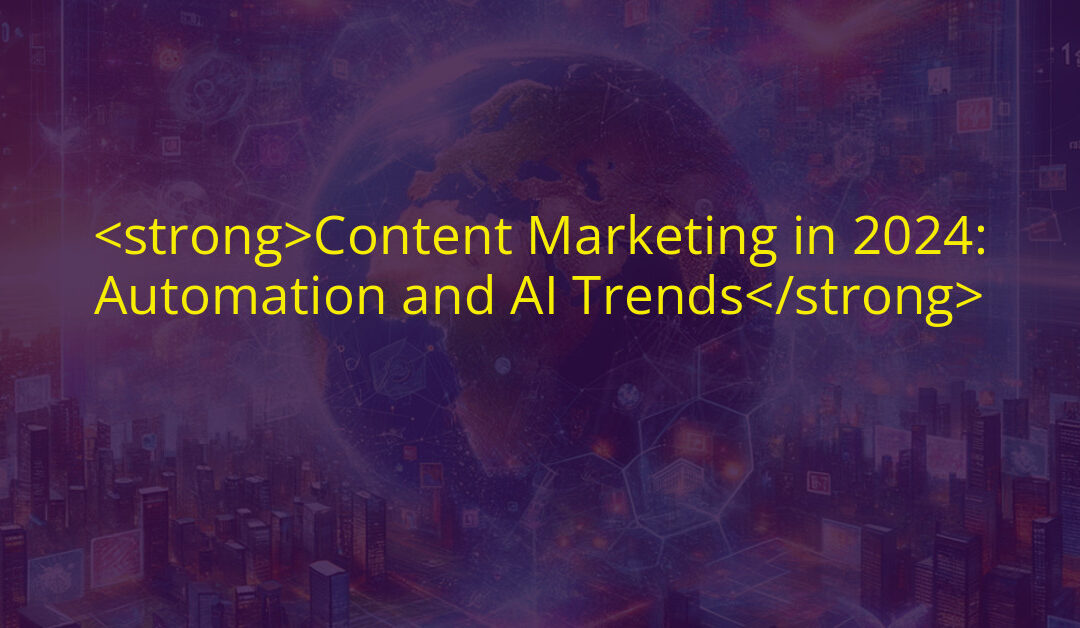Content Marketing in 2024: Automation and AI Trends
It was a quiet Tuesday morning when the robots arrived. Not in some grand, apocalyptic invasion, but in the form of auto-generated emails, social media posts, and blog content. Steve, the head of marketing at a mid-sized tech company, had set his content scheduler months ago, trusting that everything would run smoothly while he enjoyed his morning coffee. Yet, as he casually browsed through his company’s latest output, he realized something was wrong. The blog headline, “How to Improve Your Soup in 2024,” didn’t exactly align with his company’s core mission of cloud infrastructure solutions.
“Great,” Steve muttered under his breath. “The AI thinks we sell broth now.”
While this may sound like a far-fetched scene from a futuristic comedy, it’s a snapshot of the delicate dance between automation and human oversight in the world of content marketing. As we look ahead to 2024, automation and AI are set to dominate the landscape. But what’s more important is learning how to wield these tools effectively, ensuring that the robots work for us, not against us. Welcome to the world of content marketing in 2024—a world where automation isn’t just a buzzword but the key to staying relevant.
The Rise of AI in Content Creation: More Than Just Buzzwords
AI isn’t a new player in the game, but its presence is now felt everywhere. From generating content to analyzing consumer behavior, AI tools have evolved to the point where they are an essential part of any content marketer’s toolkit. Platforms like ContentERP have emerged, allowing businesses to streamline the content creation process, automate distribution, and even offer personalized suggestions based on real-time data. It’s like having a tireless assistant who never needs a coffee break and still manages to hit deadlines.
AI doesn’t just write—it’s analyzing search trends, predicting the success of headlines, and offering suggestions for types of content marketing that would resonate most with a target audience. The days when a marketer would sit down and think, “What should I write about today?” are quickly fading. Now, algorithms are doing much of the heavy lifting, predicting what will perform well, based on data from Content Marketing World 2024 and other industry trends.
Still, relying on AI without human touch is like baking a cake without tasting the batter. Sure, it might rise, but will it taste good?
The Types of Content Marketing AI Does Best
While AI can churn out content faster than most human marketers can type, it excels in certain types of content marketing. Here are a few areas where AI has found its sweet spot:
-
Data-Driven Reports and Case Studies
AI thrives on numbers and data, so it’s no surprise that it’s particularly adept at creating reports and case studies based on massive datasets. It can analyze consumer behavior, trends, and performance metrics to produce polished, professional reports that give businesses actionable insights. -
Social Media Content
We’ve all seen those eerily accurate suggestions for Instagram captions or Twitter posts. AI tools now tailor social media content with a level of precision that few human marketers can match, optimizing timing, hashtags, and even tone based on audience engagement. -
Product Descriptions and FAQs
Repetitive content, such as product descriptions and FAQs, is AI’s bread and butter. It can generate thousands of unique, SEO-optimized descriptions at lightning speed, freeing up marketers to focus on more strategic tasks. But as Steve’s soup incident reminds us, it’s always a good idea to double-check what the bots come up with. -
Personalized Email Campaigns
AI-driven email marketing has gotten smarter. By analyzing user behavior, preferences, and previous interactions, AI can craft highly personalized email campaigns that hit just the right notes. It’s like having a crystal ball that knows what your customers want before they even do.
How Automation is Changing the Content Creation Process
In 2024, automation isn’t just about scheduling posts. It’s transforming the entire content creation process, from ideation to distribution. Automated tools, like ContentERP, now allow marketers to plan, create, and distribute content across multiple platforms seamlessly. But while automation is a gift, it also comes with a learning curve.
Marketers need to balance efficiency with creativity. Automated tools can analyze trending searches today, track SEO performance, and even suggest improvements, but they don’t replace the human touch. Content is still storytelling, and storytelling needs a soul. Otherwise, we risk a future where every blog sounds like it’s written by the same robotic hand—monotonous, predictable, and devoid of personality.
Automation works best when used as an enhancement, not a replacement. It’s like a sous-chef in the kitchen, handling the chopping, measuring, and prepping, but leaving the creativity of the dish to the chef.
The Personalization Paradox: How AI Makes Content Personal
One of the biggest trends in content marketing today is personalization. Ironically, it’s AI—the most impersonal of technologies—that’s helping marketers create highly personalized content at scale. By analyzing data points like browsing habits, previous purchases, and social media interactions, AI tools can tailor content to individual users with remarkable precision.
Think of it this way: AI is like a digital gardener, planting seeds of content based on what it knows will grow best for each visitor. It’s why you might get a personalized product recommendation email moments after visiting an e-commerce site. Or why the content on your favorite blog seems tailor-made for your interests. It’s content creation with a hyper-focus on the individual, and it’s changing the game.
But as marketers embrace AI-driven personalization, there’s a caveat: balance. Over-personalization can feel intrusive, much like a waiter who knows your order before you sit down. There’s a fine line between providing a tailored experience and making users feel like they’re being watched.
The Ethical Considerations of AI-Driven Content
As AI becomes more integral to content marketing, ethical questions start to surface. Who owns the content generated by AI? How do we ensure that automated systems don’t spread misinformation or create biased content? These are questions the marketing world is only beginning to grapple with.
In 2024, marketers must navigate this new terrain with caution. Trust is a precious commodity, and losing it can happen in an instant. Marketers must ensure that AI-generated content is factual, fair, and free from bias. It’s like building a house of cards—one wrong move and the whole structure comes crashing down.
Looking Ahead: What’s Next for Content Marketing in 2024?
As we move deeper into 2024, one thing is clear: automation and AI aren’t going anywhere. In fact, they’re only going to get more advanced, more integrated, and more essential. But amidst all this innovation, marketers must remember the fundamentals. Good content still needs to engage, entertain, and inspire. Automation can handle the grunt work, but it’s the human touch that will set brands apart.
Will we one day see an entirely AI-run content marketing industry? Possibly. But even in that future, there will always be a place for creativity, intuition, and humor—the things that make us, well, human.
A Paradox for the Ages
In the fast-paced world of content marketing, where AI and automation dominate, we find ourselves asking a curious question: If a robot writes a blog post and no one reads it, does it still rank on Google? It’s a riddle fit for the digital age—a playful reminder that even as we rely more on machines, the essence of great content is connection. Whether it’s a witty tweet, an insightful article, or a product description that hits all the right notes, the goal remains the same: creating content that resonates, regardless of who—or what—creates it.

